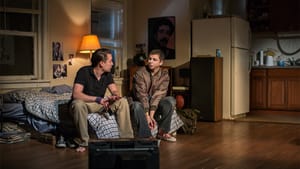Stay in the Loop
BSR publishes on a weekly schedule, with an email newsletter every Wednesday and Thursday morning. There’s no paywall, and subscribing is always free.
Coming of age in a confusing world
Revival of Lonergan's 'This Is Our Youth'

Coming-of-age plays and films have been flooding the cultural scene recently.
Of the newest arrivals this season, the most celebrated, Simon Stephens’s Curious Incident of the Dog in the Night-time, dramatizes the heroic struggle of an autistic boy for independence and self-reliance. Other plays deal with staking out one’s identity — as the sole white boy in a black community (Itamar Moses’s Fortress of Solitude at the Public Theater), or as a young Islamic boy torn apart by conflicting claims (Ayad Akhtar’s Disgraced on Broadway). The recently released film Boyhood depicts a boy charting a perilous course through the troubled waters of a broken family, while the film Very Good Girls features two teenagers facing sexual awakening.
To be sure, the coming-of-age genre has always been around, but I think we’re more aware of it lately. With the increasing and alarming reports of disaffected youth committing acts of terrorism and violence the world over, we’re all struggling to understand what is bringing the new generation to the brink. Why would three teenage girls of Somalian descent leave their homes in Denver to join ISIS in Syria? Why would the young Tsarnaev brothers, Chechen-born assimilated American citizens, blow up the Boston Marathon last year? Why would a young Canadian, recently converted to Islam, storm the Parliament in Ottawa with a machine gun last Thursday? Or (just this past Friday) why would a young high school freshman and model student in Seattle open fire on helpless classmates in his high school cafeteria?
What are we as parents and grandparents doing wrong? How are we letting the new generation down? What is missing in their lives? Is something lacking in our communities?
Revisiting Youth
I was pondering these questions as I was watching the revival of This Is Our Youth, Kenneth Lonergan’s explosive 1996 drama (which launched the career of Mark Ruffalo, who played Warren). Played today by an affecting Michael Cera, Warren is a lonely, young, pot-smoking misfit who crashes in the Manhattan apartment of Dennis, his alleged best friend. Warren is a refugee of the affluent Upper West Side, where he has lived with his father, “the most dangerous lingerie manufacturer in the world,” as Warren calls him (his parents divorced years ago). After an altercation, Warren has fled his father’s flat along with a suitcase filled with his childhood vintage toys (“the proceeds of my unhappy childhood”) plus $15,000 in cash he has “borrowed,” the result of his father’s shady sideline dealings. “My father is not a criminal; he’s just in business with criminals,” he explains to a dubious Dennis.
But Warren isn’t treated any better by Dennis, played by a charismatic Kieran Culkin. The son of another affluent Manhattan family (his father is a famous painter), Dennis is a high-wire con man who makes his living as a successful drug dealer. He easily dominates the nerdy, needy Warren with power games and put-downs, and within minutes Dennis is planning a drug-dealing scheme with Warren’s father’s money that will make him rich.
Seeking connections
While Dennis is out on the street making the necessary connections for the sales of drugs (and the antique toys), Warren spends the evening with the play’s third character, the equally geeky young Jessica Goldman (played by a fetching Tavi Gevinson, best known as a website publisher). Their tender, awkward encounter constitutes one of the play’s most touching scenes, directed with a sensitive touch by Anna D. Shapiro.
The bittersweet second act deals with the morning after. Despite the buzz of the Dom Pérignon, Warren and Jessica's relationship fizzles, along with the drug deal, and the two friends are left to confront their loneliness and emptiness. Like two of the lost boys in Peter Pan, they talk about their parents and their longing for love, comfort, safety, and guidance.
This sad story of lonely, isolated, and rudderless youth calls to mind the lyrics of a Crosby, Stills, Nash & Young song — lyrics that apply to those of us who pass sleepless nights, fearful for the next generation, lyrics that may offer some solace:
Teach your children well, their father’s hell did slowly go by
And feed them on your dreams, the one they fix, the ones you’ll know by,
Don’t you ever ask them why, for if they told you, you would cry,
So just look at them and sigh, and know they love you.
What, When, Where
This Is Our Youth by Kenneth Lonergan. Anna D. Shapiro directed. Through January 4, 2015 at Cort Theatre, 138 West 48th Street, New York, www.thisisouryouthbroadway.com.
Sign up for our newsletter
All of the week's new articles, all in one place. Sign up for the free weekly BSR newsletters, and don't miss a conversation.
